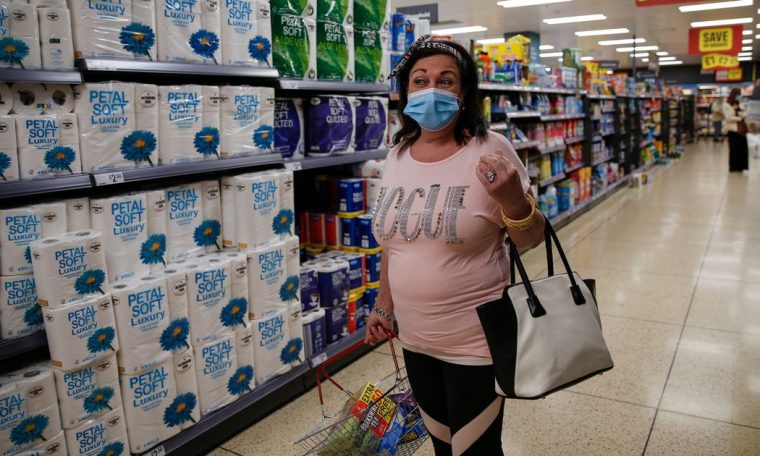
Experts have warned that some face coverings are not as effective as others, ahead of new rules coming into force in England next week.
As of July 24, anyone visiting a supermarket or shop will be expected to cover their face – or face a fine of £100.
The new rules are aimed at stemming the spread of coronavirus, amid fears of a second spike.
Deaths have fallen from coronavirus in recent weeks, but the Government acted with more people out in shops, and with the likes of nail parlours and tattoo studios now open.
Shop workers will be told to ring police on any customer not donning a face covering, after the Government announced the new rules.
The WHO advises a three-layer face covering in the community – the outer layer should be water resistant, the inner should be water absorbent and the mid-layer acts as a filter, CoventryLive reports.
It emphasises that a face covering alone cannot protect people from Covid-19, and must be combined with social distancing of at least a metre and regular hand washing.
The Government has said coverings can be made from scarves, bandanas or other fabric items, as long as they cover the mouth and nose.
But scientists at the Leverhulme Centre, who studied different types of face coverings used by members of the public, say some coverings are not as effective as others, with loosely woven fabrics, such as scarves, shown to be the least effective.
Which face coverings do not work?
Professor Melinda Mills, director of the Leverhulme Centre, said: “Attention must also be placed on how well it fits on the face; it should loop around the ears or around the back of the neck for better coverage.”
She added: “We find that masks made from high-quality material such as high-grade cotton, multiple layers and particularly hybrid constructions are effective.
“For instance, combining cotton and silk or flannel provide over 95% filtration, so wearing a mask can protect others.”
So the rest work?
A report recently published by the Royal Society suggests that even basic homemade face coverings can reduce transmission if enough people wear them when in public.
The study, based on mathematical modelling, showed that if an entire population wore face coverings that were only 75% effective, it would bring the R value, which is the number of people an infected individual passes the virus on to, from 4.0 to under 1.0, without the need for lockdowns.
Meanwhile, another study which looked at coronavirus deaths across 198 countries found that nations which had policies favouring mask-wearing had lower death rates.
In another piece of scientific research, published in the journal Proceedings of the National Academy of Sciences last month, scientists calculated that wearing face coverings prevented more than 78,000 infections in Italy between April 6 and May 9, and more than 66,000 infections in New York City between April 17 and May 9.
Dr Julian Tang, who is an associate professor of respiratory sciences at the University of Leicester, said wearing face coverings in public places could keep the R value below 1 by creating an “artificial herd immunity”.
He said: “If you look at other countries outside of the UK – such as Japan or Hong Kong – they have much higher masking percentages and are way below the epidemic curves of the West.”
But Dr Simon Clarke, an associate professor of cellular microbiology at the University of Reading, said that while face coverings may reduce the spread of cough droplets, robust epidemiological evidence on their benefits is still lacking.
He told the PA news agency: “You can see that they (face coverings) are mechanistically obvious but that is not borne out by what actually happens.
“What is really important is that you have the right mask, fitted properly and changed regularly.”
Are there any benefits to wearing them?
Experts say the risk of coronavirus transmission appears to be higher in poorly ventilated indoor spaces and wearing face coverings in small shops or enclosed shopping centres could help reduce the spread.
Keith Neal, emeritus professor of the epidemiology of infectious diseases at the University of Nottingham, said: “Lack of strong evidence of their effectiveness should not be considered a problem but the evidence is accumulating that they have a part to play in reducing transmission and also in protecting the wearer.”
In addition, there is also increased evidence which suggests that many people with the virus who do not have symptoms can still be contagious.
Prof Neal told PA that while the evidence of the upsides of wearing face coverings is “supportive rather than definitive”, he adds that “it is the asymptomatic or the pre-symptomatic people where the mask has most benefit at the public health level”.
Meanwhile, a report, published last month by the University of Oxford’s Leverhulme Centre for Demographic Science, noted: “Next to hand washing and social distancing, face masks and coverings are one of the most widely adopted non-pharmaceutical interventions for reducing the transmission of respiratory infections.”



